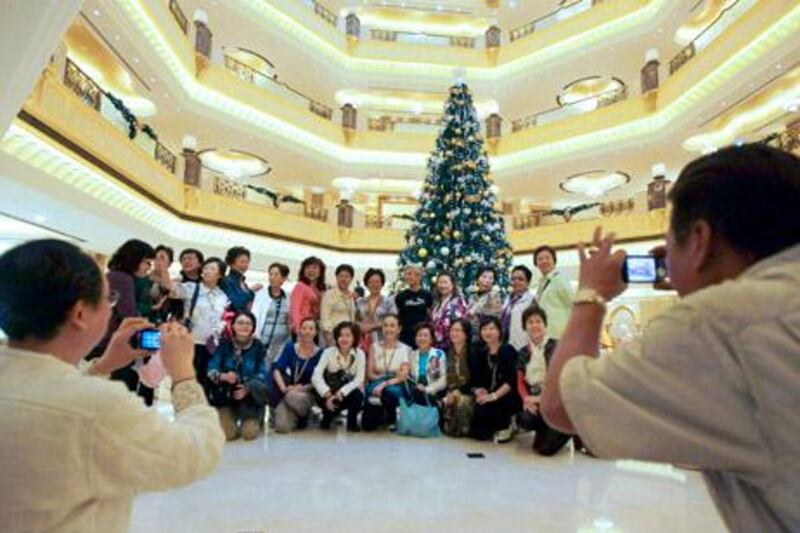DUBAI // Yawen Zhang from the Henan province in China spent the past 11 days in Dubai on holiday. "I came here for the shopping and to see the Dubai tower," said the 23-year-old student, gesturing to the Burj Khalifa. "This is my first time to visit Dubai," Ms Zhang said, adding that she had enjoyed the experience, before heading into Dubai Mall to explore the vast shopping centre.
Ms Zhang is one of a growing number of Chinese tourists visiting the UAE. With China's economic growth expected to continue and more and more Chinese travelling, hoteliers and the tourism authorities are increasingly trying to tap this market. The outbound China tourism market consisted of 47.5 million tourists in 2009, representing an increase of 3.6 per cent on the previous year. The UN World Travel Organisation predicts there will be 100 million outbound travellers from China by 2020. GDP per head, meanwhile, is forecast to more than double between 2010 and 2015, according to the Economist Intelligence Unit.
The fact that the UAE gained 'approved destination' status from the Chinese government, facilitating group leisure travel, in September 2009 has played a major role in growth in tourism from China.
"It's a very lucrative market," said Arshad Hussain, the director of sales and marketing at the Fairmont Bab Al Bahr hotel in Abu Dhabi.
"The Chinese market has been a great help for Dubai when the recession hit and western markets such as the UK were affected by the downturn."
Data from the Dubai Department of Tourism and Commerce Marketing shows an increase of 57 per cent in the number of Chinese hotel guests staying in Dubai reaching 81,932 just in the first half of last year from the first six months of the previous year.
Mr Hussain said that Abu Dhabi needed to focus even more on the Chinese market to exploit its full potential.
Abu Dhabi last year saw a 27 per cent increase in the number of Chinese guests in the first 11 months of the year compared to the same period the previous year. A total of 13,586 hotel guests stayed in the emirate between January and November last year, according to figures from the Abu Dhabi Tourism Authority (ADTA).
"Looking forward to the coming year, we would anticipate building this figure by 15 per cent," the ADTA said.
A number of measures have already been taken to attract more Chinese tourists.
In June, the ADTA opened an overseas office in Beijing. Teaming up with Hong Kong University Polytechnic, ADTA has also been staging a number of courses aimed at educating Abu Dhabi's travel and hospitality sectors on ways of meeting the specific needs of Chinese and Asian travellers.
The ADTA is also taking part in more trade shows in China to boost the destination's profile there.
Flights between the UAE and China have also increased. Jumeirah, the Dubai-based luxury hotel chain which manages the Burj Al Arab, has agreements in place to manage six hotels in China, increasing awareness of its brand there.
The Atlantis The Palm resort in Dubai, meanwhile, is anticipating a surge in business from China, having placed great emphasis on the market. Last year the resort launched its website in Chinese.
"For 2010, we have seen approximately 5 per cent of Atlantis guests coming from China, with the majority of guests coming during Chinese New Year," said Brett Armitage, the senior vice president of sales at the resort on the manmade Palm Jumeirah island. "However, we are really looking to grow that for 2011."
He said the property, which has more than 1,500 rooms, is anticipating an increase of between 30 to 40 per cent in its number of Chinese tourists this year.
"The Chinese market is very important for Atlantis The Palm and continues to be an emerging market for us," said Mr Armitage. "We will continue to focus on the market and build on the initiatives for that market.
"We are also continuing to ensure that guests from China feel welcome at the resort, from Chinese speaking staff, to offering authentic, traditional cuisine, as well as making traditional amenities available," said Mr Armitage.
Huande Xue, 42, from Qindao, said he makes frequent trips to Dubai for business and leisure. The manager of a building material company said he plans to keep coming back. "You have the Palm Jumeirah, Atlantis, the Burj Al Arab, the desert, desert safaris," he said. "It's great."






